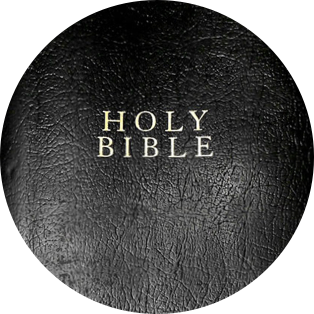Our Christian Faith
Trinity
We believe in one, eternal God in three persons: Father, Son, and Holy Spirit. Each one is distinct; yet all of one substance.
God
We believe in one God, who created the universe, the world, and all that is in the world. God is infinite in power, wisdom, justice, goodness, and love. His rule is one of grace which seeks to bring salvation to all. Read more…
Jesus
We believe that Jesus Christ, fully human and fully divine. He is the Son of God, who was crucified, died, and was buried. Three days later he was resurrected and still lives today. One day, Jesus will return to usher in a new heaven and new earth. We believe that Jesus is our Savior. In Christ, we receive abundant life and forgiveness of sins. It’s his life and teachings that we are called to imitate. Read more…
The Holy Spirit
We believe that the Holy Spirit is God’s present activity in the world. We believe that the Holy Spirit comforts us when we are in need and nudges us when we stray from God. We believe that the Holy Spirit awakens us to God’s will and empowers us to live faithfully. When we sense God’s leading, God’s challenge, or God’s support or comfort, we say that it’s the Holy Spirit at work. Read more…
Human Beings
We believe that God created human beings in God’s image and that humans can choose to accept or reject a relationship with God. We believe that all humans need to be in relationship with God in order to be fully human. Read more…
The Church
We believe that the Church is the body of Christ, an extension of Christ’s life and ministry in the world today. The Church’s mission is to make disciples of Jesus Christ for the transformation of the world. We believe that the Church is “the communion of saints,” a community made up of all past, present, and future disciples of Christ. The Church is called to worship God and to support those who participate in its life as they grow in faith.
The Bible
We believe that the Bible is God’s Word. It is the primary authority for our faith and practice and reveals all things necessary for salvation. We believe that Christians need to know and study the Old Testament and the New Testament (the Hebrew Scriptures and the Christian Scriptures). Read more…
The Reign of God
We believe that the kingdom or reign of God is both a present reality and future hope. God’s reign was present in Jesus’ ministry, and it is also present in our world whenever persons and communities experience reconciliation, restoration, and healing. We believe that although the fulfillment of God’s kingdom – the complete restoration of creation – is still to come, and the Church is called to be both witness to the vision of what God’s kingdom will be like and a participant in helping to bring it to completion. Read more…
Statement of Faith

Our Foundational Documents
With all Christians, we share the beliefs contained in the Apostles’ Creed and Nicene Creed (see below). As United Methodists, the foundation and standards of our doctrine are contained in…
- the Articles of Religion of The Methodist Church
- the Confessions of Faith of The Evangelical United Brethren Church
- John Wesley’s Sermons on Several Occasions and Explanatory Notes Upon the New Testament
- And the General Rules of The Methodist Church

Our Wesleyan Heritage
John Wesley, the founder of the Methodist movement, and the early Methodists did not seek to reformulate doctrine, but were more concerned about inviting people to experience God’s grace and to grow in their knowledge and love of God through personal and corporate disciplines of the Christian life. They placed primary emphasis on putting faith and love into action. Wesley referred to this as “practical divinity,” and it has continued to be a defining attribute of United Methodism today.
Another defining trait of our heritage is in our Wesleyan understanding of God’s saving grace. Although Wesley shared with many other Christians a belief in salvation by grace, he combined them in a powerful way to create distinctive emphases for living the full Christian life.
Grace is central to our understanding of Christian faith and life. As is stated in Ephesians: “For by grace you have been saved through faith, and this is not your own doing; it is the gift of God – not the result of works, so that no one may boast” (Ephesians 2:8-9). Therefore, grace is that undeserved, unmerited, and loving action of God in human existence. It is forever available, but we can also choose to refuse the gift. This grace, while undivided, can be described as prevenient grace, justifying grace, and sanctifying grace.
God takes the initiative in relating to humanity. Instead of us having to look for God, God seeks us and prompts us to want to please him. Through God’s prevenient grace, we are strengthened to respond to be in a relationship with God and helped to discern right from wrong.
Paul wrote to the church in Corinth: “In Christ God was reconciling the world to himself, not counting their trespasses against them” (2 Corinthians 5:19). And in his letter to the Roman Christians, Paul wrote: “But God proves his love for us in that while we still were sinners Christ died for us” (Romans 5:8).
These verses demonstrate the justifying grace of God and direct our hearts to reconciliation, pardon, and restoration. Through the work of God in Christ our sins are forgiven, and our relationship with God is restored, renewing the divine image of God in us. Again, this dimension of God’s grace is a gift. It’s God’s grace alone that brings us into relationship with him. There is no list of things we need to do to be loved and forgiven by God. Our only response is that of faith.
The process of salvation involves a transformation in us…conversion. Conversion is a turning around, leaving one orientation for another. It may be sudden and dramatic, or gradual and cumulative. It’s a new beginning that can be called new birth, regeneration, new life in Christ, or rebirth.
Justification involves repentance, a turning away from behaviors rooted in sin (read more on sin) and toward actions that express God’s love. In this conversion we can expect to receive assurance of our present salvation through the Holy Spirit “bearing witness with our spirit that we are children of God” (Romans 8:16).
Salvation is not a once and done event in our lives. It is an ongoing experience of God’s grace transforming us into the people God intends us to be. John Wesley described this dimension of God’s grace as sanctification, or holiness.
Through God’s sanctifying grace, we grow in our ability to live as Jesus lived. As we pray, study the Scriptures, fast, worship, and share in fellowship with other Christians, we deepen our knowledge of and love for God. As we respond with compassion to human needs, we strengthen our love toward our neighbor. Our inner thoughts and motives, as well as our outer actions and behavior, are aligned with God’s will and bear witness union with God.
The goal of sanctification in Christian perfection. Wesley did not mean we would not be tempted or give in to those temptations, or that we would be free of error. Instead, he taught that this is a continual process of being made perfect in our love of God and one another and of seeking to rid ourselves of the desire to sin. See Matthew 1:21; John 17:17-19; Matthew 5:48; Ephesians 4:24; Hebrews 6:1; 1 Peter 1:15-16. Read John Wesley’s sermon on Christian perfection. Read more…
We believe that faith and good works belong together. Our works do not save us, but our salvation should manifest itself in what Wesley called “fruits meet for repentance.” As James wrote “faith by itself, if it has no works, is dead” (James 2:17).
In response to God’s saving action in Jesus Christ, we show our gratitude by offering our lives back to God through a life of mission and service. Love of God and love of neighbor cannot be separated, and we strive to join our hearts and hands in working for justice and renewal in the world.
For Wesley, there was no religion but social religion, no holiness but social holiness. In other words, faith always includes relationships. One cannot be a solitary Christian. As we grow in faith through our participation in the church community, we are also nourished and equipped for mission and service to the world. Staying connected with other Christians strengthens our faith in God and enhances our witness in the world.
Read more about our distinctive Wesleyan heritage.
The Apostles’ Creed
I believe in God, the Father Almighty,
creator of heaven and earth.
I believe in Jesus Christ, his only Son, our Lord,
who was conceived by the Holy Spirit,
born of the Virgin Mary,
suffered under Pontius Pilate,
was crucified, died and was buried;
he descended to the dead.
On the third day he rose again;
he ascended into heaven,
is seated at the right hand of the Father,
and will come again to judge the living and the dead.
I believe in the Holy Spirit,
the holy catholic church,
the communion of saints,
the forgiveness of sins,
the resurrection of the body
and the life everlasting. Amen.
The Nicene Creed
We believe in one God,
The Father, the Almighty,
Maker of heaven and earth,
of all that is seen and unseen.
We believe in one Lord, Jesus Christ,
the only Son of God,
eternally begotten of the Father,
God from God, Light from Light,
True God from True God,
begotten, not made,
of one being with the Father;
through Him all things were made.
For us and for our salvation
He came down from heaven,
was incarnate of the Holy Spirit and the Virgin Mary
and became truly human.
For our sake He was crucified under Pontius Pilate;
He suffered death and was buried.
On the third day He rose again
in accordance with the scriptures;
He ascended into heaven
and is seated at the right hand of the Father.
He will come again in glory
to judge the living and the dead,
and His kingdom will have no end.
We believe in the Holy Spirit, the Lord, the Giver of Life,
who proceeds from the Father,
who with the Father and the Son
is worshiped and glorified,
who has spoken through the prophets.
We believe in one holy catholic and apostolic church.
We acknowledge one baptism
for the forgiveness of sins.
We look for the resurrection of the dead,
and the life of the world to come. Amen

